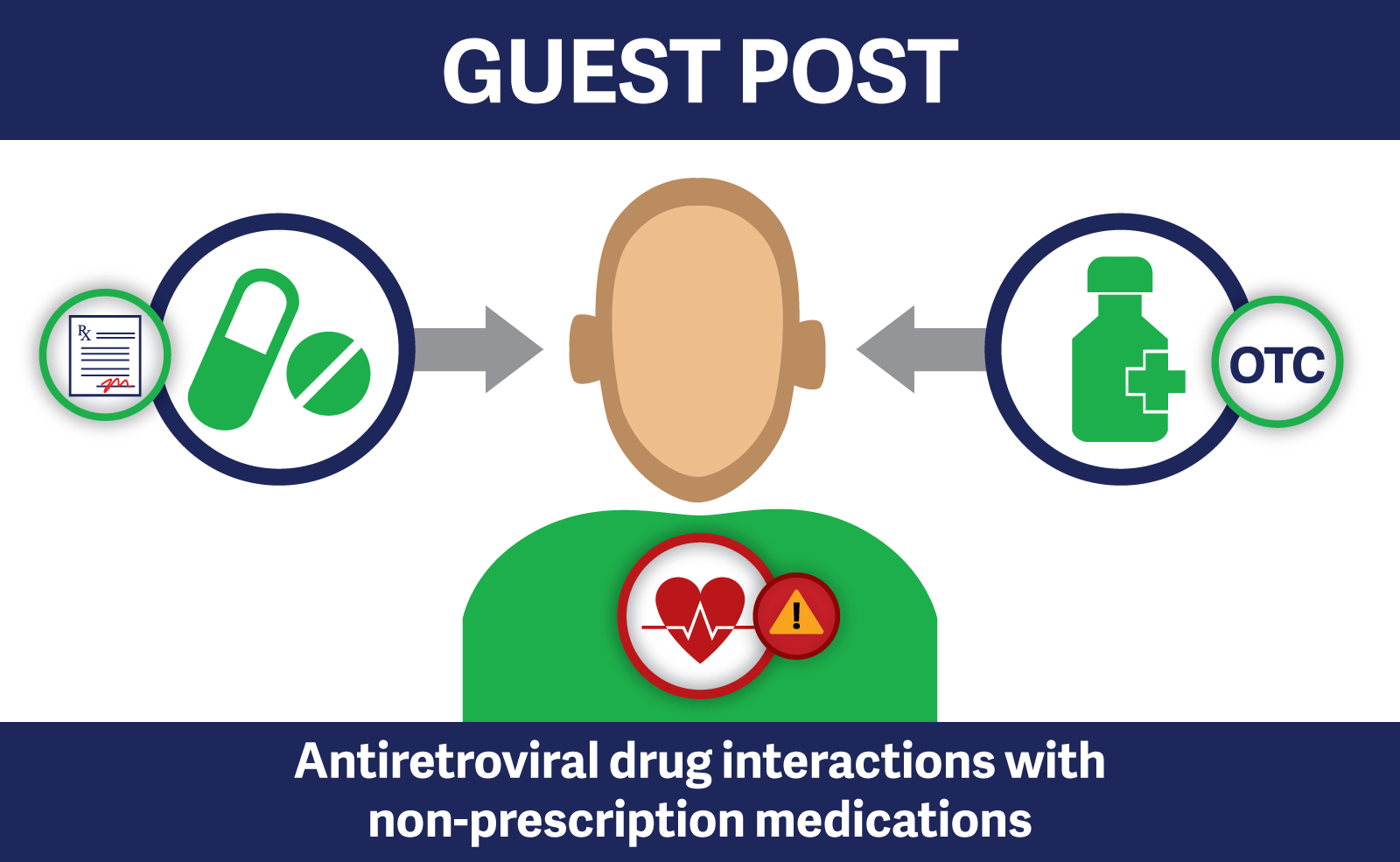Guest Post: Antiretroviral Drug Interactions with Non-Prescription Medications
This article was originally published as a Pharmacovigilance Initiative Safety Alert by the British Columbia Centre for Excellence in HIV/Aids on June 6, 2017.
Patient safety concern
Drug interactions between antiretroviral drugs and other medications can result in loss of therapeutic efficacy or drug toxicity. Selected proton pump inhibitors and inhaled corticosteroids recently became available as non-prescription products in BC. These, and other non-prescription medications, can have clinically important interactions with certain antiretroviral drugs, as summarized in the table below.
Clinically important antiretroviral drug interactions with non-prescription medications
| Non-prescription medication | Antiretroviral drug interaction | Management |
|---|---|---|
|
Inhaled corticosteroids: (nasal sprays)
Anti-inflammatory, used for allergic rhinitis (hayfever) |
Can significantly increase the amount of systemic corticosteroid, which may lead to Cushingoid symptoms and/or adrenal suppression |
Do not use: Select a therapeutic alternative for management of allergic rhinitis. |
|
Proton pump inhibitors (PPI):
Suppresses secretion of stomach acid, used for heartburn |
PPIs can significantly decrease absorption of the HIV drug |
Do not use: Select a therapeutic alternative for management of gastrointestinal symptoms |
|
H2 blockers:
Suppresses secretion of stomach acid, used for heartburn |
H2 blockers can significantly decrease absorption of the HIV drug. |
Caution: Dose separation is required and there are limitations on maximum H2 blocker dose. See drug-specific medication information sheets.* |
|
Antacids:
Reduces stomach acid, used for heartburn |
Antacids can significantly decrease absorption of the HIV drug. |
Caution: Dose separation is required. See drug-specific medication information sheets* |
|
Mineral supplements:
Used as nutritional supplements |
Polyvalent cations can significantly decrease absorption of the HIV drug. |
|
| St John's Wort A herbal medicine used for depression |
St John's Wort induces metabolic pathways which can significantly decrease the levels of most antiretroviral drugs. | Do not use: Select a therapeutic alternative or non-drug measures |
*Medication information sheets available at: http://www.cfenet.ubc.ca/drug-treatment-program/information-sheets
This is not a comprehensive list of drug interactions with antiretroviral medicines
Recommendations
- Encourage persons who are taking antiretroviral therapy to inform all their healthcare providers about their HIV medications, and to consult their pharmacist and doctor before taking any new medicine, including non-prescription products and supplements.
- When caring for persons living with HIV, obtain a complete medication history and check for drug interactions prior to recommending or prescribing any new medications. Note: the following medications do NOT usually appear on the BC Pharmanet medication profile:
- Antiretroviral medications.
- Non-prescription medications, traditional or herbal remedies, supplements.
- Medications purchased via the internet.
- Product samples obtained from a clinician.
- In BC, healthcare providers who are directly involved in a patient’s care may confirm the current antiretroviral drug regimen by contacting a pharmacist at:
- St Paul’s Hospital Ambulatory Pharmacy: 1-888-511-6222
- Individualize drug therapy to avoid or minimize the risk of drug interactions:
- If possible, select a therapeutic alternative which will not interact with the antiretrovirals.
- If appropriate, adjust the dose, or separate administration times of the interacting medications.
- If appropriate, adjust the dose of the antiretroviral medication (consult an HIV specialist).
- Change the antiretroviral regimen to avoid the drug interaction (consult an HIV specialist).
Antiretroviral drug interaction resources:
- HIV medication information sheets. Available at: http://www.cfenet.ubc.ca/drug-treatment-program/information-sheets
- HIV Drug Interactions. University of Liverpool. Available at: http://www.hiv-druginteractions.org/
- Drug Interaction Tables. Immunodeficiency Clinic, Toronto General Hospital. Available at: http://hivclinic.ca/drug-information/drug-interaction-tables/ and at http://app.hivclinic.ca/
Thank you for reporting suspected adverse reactions to antiretroviral drugs
The BC Centre for Excellence in HIV/AIDS (BC-CfE) Pharmacovigilance Initiative conducts ongoing monitoring of adverse reactions to antiretroviral drugs in order to identify drug-related problems and alert health care providers and patients regarding safety concerns. How to report: Complete the adverse reaction section on the HIV drug prescription request or therapy discontinuation form (available to HIV care providers) or download an adverse reaction report form at www.cfenet.ubc.ca (available to any health care provider, patient or caregiver). Contact the BC-CfE Pharmacovigilance initiative: Telephone: 604-806-8663 Fax: 604-806-9044 E-mail: [email protected] SAFETY ALERT editors: Ms Kathy Lepik BSc(Pharm), MSc; Research Coordinator, Pharmacovigilance Initiative Dr. Rolando Barrios MD; Principle Investigator, Pharmacivogilnace, Assistant Director BC-CfE Acknowledgement: Dr. Junine Toy Pharm D, Ms Linda Akagi BSc(Pharm) |
An electronic copy of the SAFETY ALERT is available at http://cfenet.ubc.ca/hiv-drug-safety

Katherine Lepik
Katherine Lepik is a clinical pharmacist at St Paul's Hospital Ambulatory pharmacy and is the Research Coordinator of the BC Centre for Excellence in HIV/AIDS Pharmacovigilance Initiative. She completed her BSc(Pharm) at UBC in 1983, followed by a hospital pharmacy residency at Shaughnessy Hospital. Katherine worked at BC Children's Hospital and the BC Drug and Poison Information Centre before completing her MSc in Epidemiology at UBC School of Population and Public Health in 2007. Since then she has been working in the field of HIV care, with a particular focus on patient safety and adverse drug reactions.
.jpg)
Dr. Rolando Barrios
Dr. Rolando Barrios is the Assistant Director of the BC Centre for Excellence in HIV/AIDS (BC-CfE) and, in this capacity, he leads important programs in the areas of patient safety and continuous quality improvement. He is the principal investigator of the BC-CfE Pharmacovigilance Initiative and co-chair of the Committee for Drug Evaluation and Therapy. Dr. Barrios is also the Senior Medical Director of Vancouver Coastal Health. He completed his training in Family and Community Medicine at the University of Calgary, Alberta and was granted a Royal College of Physicians of Canada fellowship in Community Medicine in 2002.
- Guest Post, Drug Interactions


 Share
Share



